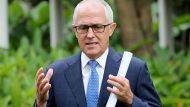He is the US president's most prominent political spokesman but his high profile didn't protect Sean Spicer from being temporarily banished from Air Force One. Spicer was among a group of Donald Trump's senior aides who were banned from the presidential aircraft a week ago after Trump erupted in frustration at his staff during an Oval Office meeting.
At the same time as Spicer is learning to find alternative means of transport, he is not spending a whole lot of time in front of the camera. Monday was the seventh straight day that Spicer, President Donald Trump's press secretary, declined to hold a televised White House press briefing, an unusually long drought for someone whose role is traditionally to be the most visible face of a presidential administration.
More World News Videos
Trump dodges WikiLeaks question
During a meeting with small bank CEOs at the White House, President Trump declines to answer when a reporter asks a question about WikiLeaks.
Instead, Spicer, who since the inauguration had become a highly rated, if often-parodied, staple of daytime television, conducted a question-and-answer session with no cameras allowed, over the objections of the White House Correspondents' Association.
The briefing was certain to be contentious. Spicer responded for the first time to explosive and unproven allegations Trump made over the weekend that his predecessor, Barack Obama, had wiretapped his phones at Trump Tower during the presidential campaign.
The public was not given a way to watch the briefing but was able to listen via an audio-only broadcast by PBS.
At one point, when a CNN reporter tried to interject with a question, Spicer pushed back, saying: "You're not on camera. You don't need to jump in." He called on the reporter later.
Past press secretaries said it was unusual that they would stay off television for a full week. And Spicer's absence from the airwaves coincides with a rough period: He was criticised by Trump in a Fox News interview, and his closest ally in the administration, Reince Priebus, the chief of staff, is under fire from rival factions within the White House.
Trump's West Wing is awash in palace intrigue, and people in and around the administration noted that two other representatives, Spicer's deputy, Sarah Huckabee Sanders, and the White House counsellor, Kellyanne Conway, appeared on morning television shows Monday to speak on the president's behalf. The president has also privately expressed frustration with the performance of his press office.

Press secretaries do not always perform their duties on TV. Like his predecessors in Democratic and Republican administrations, Spicer speaks with journalists in more informal, off-the-air settings several times a week, when the president is travelling, for instance. But these so-called gaggles are typically interspersed among more formal briefings carried live on cable news.
Former press secretaries Ari Fleischer and Mike McCurry have argued that cameras should not be allowed in the briefings at all, the idea being that the presence of cameras has helped turn the briefings into spectacles rather than considered discussions of policy.

In an email, Spicer said he had lived up to his pledge to hold briefings with reporters on a near-daily basis, "some on camera, some off". He noted that the White House had rolled out its revised executive order on immigration Monday, a nod to a past practice in which the press secretary did not hold an on-camera briefing on days featuring a major announcement.
Trump's Secretary of State, Secretary of Homeland Security and Attorney-General held an event with journalists on Monday, but the three officials did not respond to questions. And Trump signed his executive order without photographers or reporters on hand to record the event, a break from typical practice.

When reporters at Monday's briefing raised concerns about openness, Spicer defended his administration. "I've heard from several of you that we have gone above and beyond allowing the press into events," Spicer said, adding, "I think this president has been extremely transparent."
Hours after the briefing, Spicer was approached by reporters on a driveway outside the West Wing, where he acquiesced to answering a few questions on-camera.

Spicer did make one scheduled television appearance in the last week, on Fox & Friends, the Trump-friendly morning show, which ran a feature about the press secretary's life at the White House.
When the Fox interviewer, Abby Huntsman, asked Spicer whom he feared more, the president or the news media, Spicer, unsmiling, replied, "I don't fear anybody."
He added, "I don't want to disappoint this president."
New York Times
















